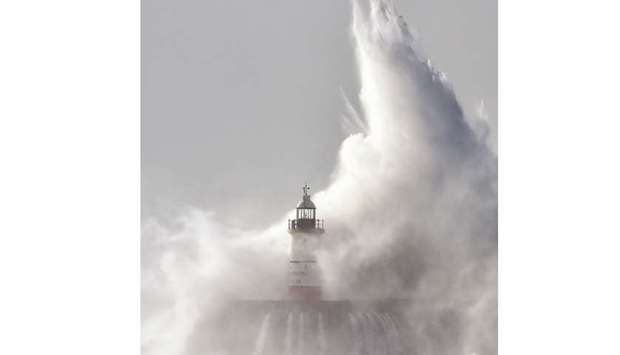A yellow weather warning for winds across a swath of Britain, including Wales and southern England up to the Midlands and North West, will remain in place until midnight yesterday.
Gusts of 78mph, the highest recorded yesterday afternoon, struck the Lln Peninsula on the northwest coast of Wales, the Met Office said.
Dozens of flights and ferry crossings have been cancelled because of the high winds, with British Airways cutting 10 flights to and from Heathrow to reduce the number of aircraft movements at the airport.
The rough seas and strong winds have forced Brittany Ferries to cancel eight sailings, with Irish ports particularly affected by the rough conditions.
P&O Ferries has also been hit by the disruption and yesterday evening it cancelled all crossings of the Irish Sea between Dublin and Liverpool.
The company’s sailings over the Channel between England and France were also delayed by the weather.
The Great South Run in Portsmouth and Southsea was cancelled but today’s events are due to go ahead following a better forecast.
The latest extreme weather system moving towards Britain comes just six days after Storm Ophelia swept across the Republic of Ireland, resulting in three deaths.
Forecasters from the Met Office said the combination of high tides and winds gusting at 60 to 70mph could create dangerous conditions along exposed southern and western coastal areas.
Torrential rain is expected to hit Wales and the west of England last night.
Waves were seen crashing at Porthcawl in south Wales yesterday morning, while Environment Agency workers were pictured erecting temporary flood barriers in Yarmouth on the Isle of Wight.
Up to 8.4mm (0.3”) of rain fell in an hour in Port Logan, southwest Scotland yesterday afternoon with heavy rain expected in the northwest of England as Storm Brian moves across from Ireland.
While the effects are already being felt, the storm is expected to make landfall in Britain in the Lancashire area later this evening, the Met Office said.
In Ireland, the Irish weather service, Met Eireann, said an orange weather warning was in place across the country: “It will be extremely windy in the south and west this morning with stormy conditions around coasts and the risk of flooding.”
While most of the flooding and damage from overflowing rivers has been concentrated in the west and southwest, Met Eireann said the river Shannon burst its banks.
There was flooding around the Merchants Quay area of the city centre and affected buildings included the tax office.
Tributaries of the Shannon had also overflowed, with flooding reported in Mullingar, as well as the counties of Waterford and Kilkenny.
Meanwhile, in cities such as Galway and Cork, and towns across the west and southwest, flood defences had been set up and sandbags placed in front of homes and businesses.
The intercity rail network, including the Cork to Dublin line, were subject to delays of up to 30 minutes due to speed restrictions, the Irish rail service, Iarnrod Eireann, said.
One of Ireland’s top tourist attractions, the Cliffs of Moher on the Atlantic coast in County Clare, had been closed due to the high winds.
Woodlands and forest parks in counties Cork and Galway had also been shut.
The Irish Coast Guard appealed to the public to stay away from the worst affected coastal areas.
Spokesman Gerard O’Flynn advised extreme weather enthusiasts not to get too close to the sea or rivers.
“The timing is unfortunate. It’s bad winter weather, but hopefully won’t be as mad as Monday [when Ophelia struck],” he said.
The Irish government’s emergency committee said people should expect some power outages.
The Electricity Supply Board said that engineers were still working to restore power to homes affected by Storm Ophelia.
A further 8,000 homes, farms and businesses had been reconnected yesterday, bringing the total to 356,000 customers.
A further 29,000 households remain without power.

